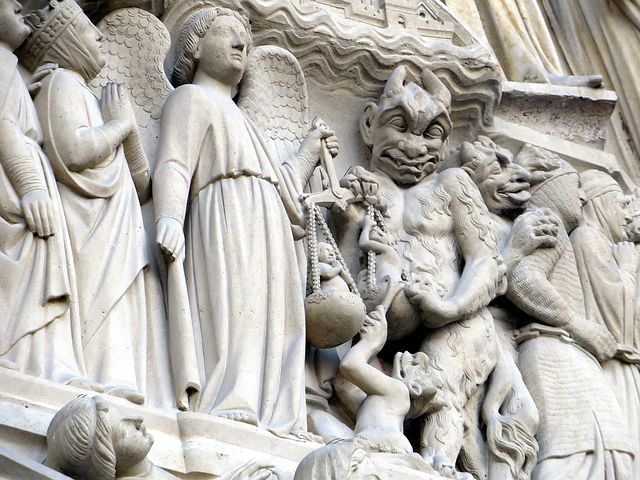I have been accused frequently over the years by commenters on my blog and on Facebook of promoting an understanding of Christianity that is significantly different than “traditional and historical” Christianity. I’m not sure what these critics thought they were going to find on a blog called “Freelance Christianity” the they found on Patheos’ “Progressive Christian” channel, but there you go. I’m somewhat amused by the “traditional and historical Christianty” trope, because that almost always means “what conforms to my version of Christianity”–a trope that tends to entirely ignore the actual messay and open-ended process that for almost two millennia has shaped and continues to shape the Christian faith.
An ongoing conversation that I have with new freshmen every fall centers on the nature of the Christian faith. At its core, was Jesus promoting a system of belief or a way of life? Is true Christianity an orthodox (“right belief”) or an orthopraxic (“right action”) religion? These conversations are often fascinating, but are equally often slow to get started, especially when focused on particularly esoteric texts.
For instance, one day during a recent fall semester my students and I were in the middle of early Christianity; the texts for the day were essays about two of the central doctrines of the Christian faith from two fourth-century theologians: Hilary of Poitiers on the Trinity, and Athanasius on the Incarnation. And despite my best efforts, my eighteen freshmen—many of them the products of twelve years of Catholic parochial education—had nothing to say.

I can’t say that I blame them. These texts were definitely heavier lifting than seminar texts like the Iliad or even Plato’s Symposium from earlier in the semester. Choosing to focus on the Incarnation, I reminded them of the underlying issue at the heart of Athanasius’ discussion: How are Christians to understand the Second Person of the Trinity? I also reminded them of the various competing possibilities raised by my theologian colleague in his setup lecture a few days earlier. Sabellius, Ebion, Arius, the Monophysites, the Docetists, and many others were jockeying for position with their varying suggestions along with the eventual winning idea promoted by Athanasius and others, the position ultimately incorporated into the Nicene Creed:
We believe in one Lord, Jesus Christ, the only Son of God, eternally begotten of the Father, God from God, Light from Light, true God from true God, begotten, not made, of one Being with the Father. Through him all things were made.
The creed’s claim concerning Jesus is that he was not just a human being with special divine favor, nor was he a divine being pretending to be human, nor was he less than God the Father, nor was he some strange mixture or brew of divinity and humanity stirred together in a new ontological concoction. He was “begotten,” not “created.” “Whatever,” my students’ faces were saying. “Is this going to be on the test?’ they were wondering. So I decided to ask them the question that none of them dared but all of them wanted to ask.
“Suppose you were a fourth-century Christian woman or man,” I began. “Not a theologian or anyone special, just an ordinary, garden variety person claiming to be a Christian. All you want to know is ‘How should I live today in real time, at my job, with my family and friends, as a Christian? What does this faith I profess require of me today?’ Would either of these texts provide such a person with any practical guidance? Would reading Hilary or Athanasius help an aspiring Christian figure out how to live her or his faith more effectively and fruitfully?” No one said anything immediately, but several students began slowly shaking their heads. “I don’t think so,” one of them finally offered tentatively. And I addressed the elephant in the room: Then what is the point? Who cares? Why are we wasting our time with this?
I have told my freshmen before that “So what?’ is the best philosophical question one can ask, but they didn’t expect me to actually ask it in the context of matters that many of them have been taught involve one’s eternal soul. My thinking about this has been greatly influenced by William James, a American pragmatist philosopher whose work we were focusing on in one of my other classes. James suggests that the test of whether esoteric debates about abstract matters are worthwhile is a very practical one.
The pragmatic method in such cases is to try to interpret each notion by tracing its respective practical consequences. What differences would it practically make to anyone if this notion rather than that notion were true? If no practical difference whatever can be traced, then the alternatives mean practically the same thing, and all dispute is idle. Whenever a dispute is serious, we ought to be able to show some practical difference that must follow from one side or the other’s being right.
I’m sure that Athanasius’ discussion and the niceties of doctrinal hairsplitting has meant and does mean something practical to many people over the centuries. As one of my teaching colleagues noted, in the fourth century it seemed that one’s eternal life might depend on getting this right. And maybe it does. But try selling that to eighteen college freshmen, especially when I myself am not convinced that the various distinctions really make a practical difference.
Fortunately, passages from the Gospel of John had been assigned as well for seminar, so the students had Bibles with them. I took them to two brief passages early in the Book of Acts, one of which is today’s first lectionary reading. They read descriptions of how followers of Jesus (not even called “Christian” yet) chose to organize their fledgling communities in the early years after Jesus was gone. After hearing how the members of these communities sold their property and brought the proceeds to the community leaders, who then “distributed to each as anyone had need,” I asked the students for their initial thoughts and reactions.
“They were like a bunch of Communists!” was the general reaction. After they shared some of the reasons they have been taught that an economic system built on the elimination of private property is guaranteed to fail, I asked them to consider why they supposed the followers of Jesus chose to economically organize their fledgling communities in this way. Why did they choose to live out the directive that “each contributes according to their ability, and each receives according to their need” centuries before the phrase was coined?
Most of the members of these communities knew of Jesus only through stories told second- and third-hand; little to nothing had been written down. No one had even thought of “Christian doctrine” yet. The leaders of the communities might perhaps have met or seen Jesus in person; a few of the leaders might have been part of Jesus’ inner circle. As my students considered my question, they eventually came to an obvious possibility—these early followers of Jesus simply were asking themselves “If Jesus was here with us, how would he want us to organize our community economically? What is the most ‘Jesus-like’ way to deal with property, the things that people need, and the demands of community life?” Acts tells us the answer.
Now all who believed were together, and had all things in common, and sold their possessions and goods, and divided them among all, as anyone had need.
When faced with the practical challenge of how to live a life guided by Jesus’ example, they formed communities of mutual support and sharing—because such communities seemed most in keeping with what they knew of Jesus’ teaching and life. We, two millenia later, know from the gospels—which they did not have—that they got it right. Their communities were attempts to live out what Jesus taught in the Sermon on the Mount and elsewhere.
The ensuing class discussion was active and fascinating. Students began to consider what it might be like to live in a community of individuals with shared beliefs and commitments, where the needs of each member were considered to be as important as one’s own needs. Might traditional critiques of “socialism” be less effective when individual rights and self-interest were not the primary concern of community members? Most importantly, students realized that the questions the early followers of Jesus were asking are just as relevant to persons of faith today. Rather than wondering whether our doctrinal beliefs and commitments are sufficiently pure and orthodox, we would do better to ask how we are going to live our faith out in the various circumstances and challenges that face us each day. As the author of Acts asks, how are we to follow Jesus with “gladness and simplicity of heart”?












